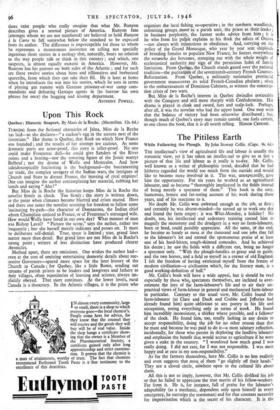Upon This Rock
Quebec : Historic Seaport, By Mazo de la Roche. (Macmillan. 12s. 6d.)
TURNING from the fictional chronicles of Jalna, Miss de la Roche has laid—so she declares—" a cuckoo's egg in the austere nest of the historians." Her theme is Quebec, that Rock on which New France was founded ; and the results of her attempt are curious. As some dramatic parts are actor-proof, this story is teller-proof. No one could make Frontenac dull—he could give Sanders of the River points and a beating—nor the towering figure of the Jesuit martyr Brebeuf ; nor the drama of Wolfe and Montcalm. . And how Kaleidoscopically fascinating is the background—the buccaneering *ur trade, the complex savagery of the Indian wars, the intrigues of Church and State in distant France, the massing of rival empires! One can imagine the author contemplating her material, rubbing her hands and saying " Aha!"
But Miss de la Roche the historian keeps Miss de la Roche the novelist firmly in check. Too firmly ; the story is written down, to the point when climaxes become blurred and crises muted. Here and there one notes the novelist straining for freedom to follow some 'ascinating by-path—the character of Donnacona, the Indian chief whom Champlain enticed to France, or of Frontenac's estranged wife. How would Wolfe have fared in our own day? What manner of man was Bishop Laval? " Picture the scene," says the author, rather too frequently ; but she herself merely indicates and passes on. It must he deliberate self-denial. True, space is limited ; true, grand lines matter more than detail. But grand lines are not Miss de la Roche's strong point ; writers of less distinction have produced clearer chronicles.
Method apart, there are omissions. One wishes the author had— even at the cost of omitting entertaining domestic details about suc- cessive Governors—spared more space for the later history of the Church in Canada ; for Quebec, like a little Rome, sending out streams of parish priests to be leaders and lawgivers and fathers to :heir villages, often repositories of learning and science, always im- plicitly. obeyed. That story continues. At the lower levels, rural Canada is a theocracy. In the Atlantic villages, it is the priest who organises the local fishing co-operative ; in the northern woodlands, colonising groups, move as a parish unit, the priest as their-leader ; in business perplexity, the fanner seeks advice from him ; it is he who from his pulpit explains to his flock the edicts of Ottawa —not always with injunctions to obedience. And, carrying on the policy of the Grand Monarque, who year by year sent shiploads of breeding females to populate New France, he fosters everywhere the revanche des berceaux, stamping out with the whole weight of ecclesiastical authority any sign of the pernicious habit of family limitation. From Quebec, the Church stands guard over the national tradition—the puritanism of the seventeenth-century French Counter- Reformation. From Quebec, a militantly nationalist provincial government manoeuvres its solid French-Canadian phalanx ; often to the embarrassment of Dominion Cabinets, as witness the conscrip- tion crises of two wars.
But Miss de la Roche's interest in Quebec dwindles noticeably with the Conquest and still more sharply with Confederation. Her drama is played in cloak and sword, furs and scalp-lock. Perhaps, after all, it was the novelist who had the upper hand. One may wish that the balance of victory had been otherwise distributed ; but, though much of Quebec's story may remain untold, one feels certain, as one closes the book, that it is all worth telling. HONOR CROOME.






























 Previous page
Previous page